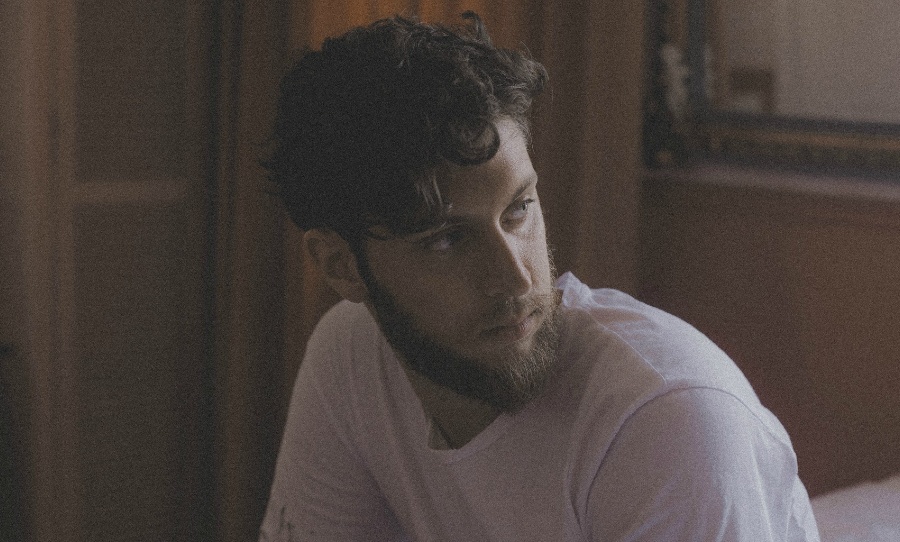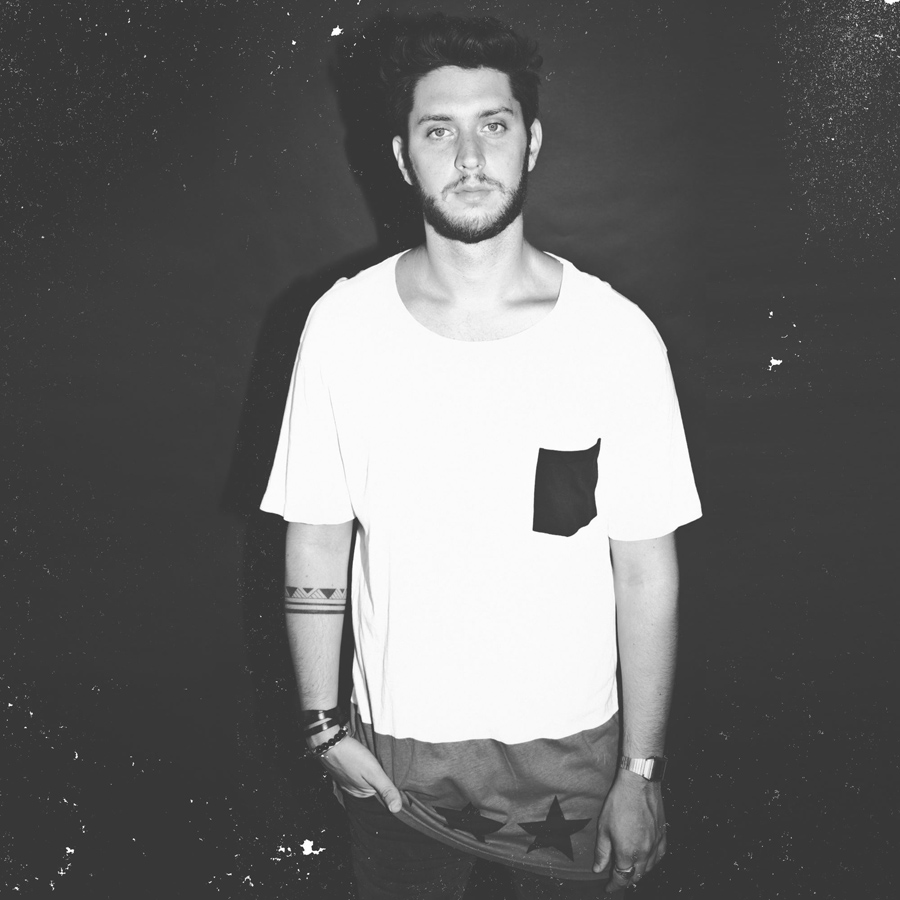Dan Farber has been working with Tkay Maidza for over six years. They are best friends and that personal connection is key to his success as an in-demand writer and producer.
Dan Farber is an Israeli-born, Los Angeles based songwriter, producer, artist, mixing and mastering engineer who has worked with Australian Artists Tkay Maidza and Nicole Millar, and international artists like Lizzo and Dizzee Rascal. He’s known for getting in on the ground floor of a production and connecting with artists for the long haul. It’s paid dividends.
Last Year Was Weird Vol. 2 by Tkay Maidza has hit great heights with multiple ARIA nominations and represents the culmination of their six-year-long working relationship. Dan Farber chatted with us about musical intent, production, engineering, and creating just the right environment for the artists that he works with.

HAPPY: So, have you been in the studio today?
DAN: Yeah — I’ve been chopping some samples (Dan plays a chopped sample from a vinyl). Always working man, though it’s hard to call it ‘work’.
HAPPY: Yeah, I know, sometimes it feels likes a video game!
DAN: Yeah, it’s like oh I need to work today. “What do I need to do?” Make beats or listen to the band I have a session with tomorrow, or checking out songs to be released. This is what I’ve always wanted, so I’m very grateful.
HAPPY: That’s so refreshing to hear! Do you work from one studio?
DAN: No, I work everywhere, I have my setup at home — I can give you a tour (turns camera to studio)! Here’s the setup: tah dah! Here I have the fundamental stuff I need to make records, a lovely Juno here, some guitars there.
I enjoy working from here. It’s nice, it feels good. It’s not a lot of pressure, so It feels very homely to write songs from here and host artists. I have sessions in other places two or three times a week and I just take some guitars on my back.
HAPPY: Do you take that lovely Juno with you?
DAN: When it’s called for. When there is absolutely nothing in the room and I know I want it for the specific session. Usually, I take one of my basses or a nylon string but it depends on the artists and the room, if there’s something in the room that I know I’m missing, I’ll bring it.
HAPPY: Do these ideas of what to take to a session happen with thinking or listening to an artist and saying “oh I’ll take this today?”
DAN: Yeah, it’s definitely like that. It depends on the artist and a lot of the time I think about contrast: what doesn’t this artist have, or what haven’t I heard from them. Let’s say it’s a folk writer and I listen to their latest project and it’s all acoustic guitars — so I might bring a 12-string or ukulele, whatever is going to be different. Or yes, I’ll bring the Juno.
It also comes from listening, researching and trying to inspire me. That’s my constant thing, finding inspiration, for myself and for others. That’s what my life is about.
HAPPY: Switching to your work with Tkay Maidza — she’s killing it in Australia — you two have had a long-running and fruitful collaboration. How did you first meet her?
DAN: I met Tkay six years ago when we had a session that my old management and her publisher set up for us. The session was at Stargate House. It was really great, there was a personal connection there. I am a true believer in personal connections when you are trying to make records that mean something.
You need to have some sort of comfort and friendship to talk about the things that mean something to you. It’s not just like trying to write whatever and put some words out there. I believe in intentions a lot. After the session, Tkay and I became friends. We stayed in touch. I was asking her how her tour was going, You know friendship stuff, personal connection. Then we made one more song on her debut, called Castle In The Sky, and that’s when we felt like, “oh we should go in for a week and see what comes out.”
HAPPY: How has that evolved over the six years? How quickly do you work together now?
DAN: Very quickly. She’s my best friend, you know. It almost feels unfair. With us, all the pressure goes out the window and all the nitty-gritty, personal stuff just flows out naturally in a session when we are trying to write something. It’s pretty quick, like — we were talking about it last night — if we have a task to do, we say “let’s try to make a quick vibe that sounds something like this”, we do it in literally 30-45 minutes and it’s really fun.
Plus, we are both hard workers and we have made so much music together. Out of what we have released together — 30 or 40 songs — we have 100s of them. We keep making music, we sit on folders and folders, we’re like “oh remember that little melody from three years ago on that weird beat, what if we flip the beat and change it to half time” and it might inspire something that works.
HAPPY: In Syrup, all the vocal treatment, vocal doubles and harmonies, and key moments are really cool. How do you approach vocal production?
DAN: That’s my favourite thing. I love vocal production. I think it’s such an important part of every song, and I try to keep it fresh and keep it unique. Every song has its own colour and its own taste. If I would do all of the vocal production on Tkay’s the same, sure, it would be cohesive, but it wouldn’t be as surprising. I do keep some things the same as the compressors or microphones, so we have some consistency.
The vocal treatment on Kim has very weird delays, and on Syrup there are three stack vocals. I would usually do four stacks, but Syrup has pairs of three so there’s one in the centre that always comes out the front. There are also whispers that are really tucked in. There’s a lot of slap delays too, but I wanted to keep it very clean, dry and driving. So it’s very in your face and constant. I like how minimal that song is. That’s the hardest thing sometimes. I find it fascinating to make something minimal sound really big. To not have a lot of elements, but every element sounding just right.
HAPPY: Do you feel you are getting better at working with those minimal elements?
DAN: Yeah, that’s the beauty of what we do, and everything in life, not just in music. If I would try to do a painting of a plant every day for 365 days of the year, the 300th painting would be way better than the first one. As long as I keep doing it every day. Like you asked if I worked today, and I’m like “yeah, everyday man”. As long as I keep chopping, keep listening, keep taking information in and trying new things. I feel like I’m getting better — you tell me!
HAPPY: Definitely! I’ve been digging into your Spotify playlist Produced by Farber and I really love it. You have such a wide range of artists, from Tkay to Mallory Merk. Are there production ‘essentials’ that tie together all your work?
DAN: Intention. If there’s an intention behind the song, other people will connect to it. Even if it’s someone at a label or someone helping release it. If there’s an intention behind it, it’s more likely that it will come out. Because there are songs that are super melodic and have lots of chord changes, and then there are some that are minimal, like Syrup, which has nothing. I think that’s important to know what you are going to do. Even if it’s just fun — that’s a good reason to make music too.
HAPPY: Which DAW do you use?
DAN: I use Logic Pro. I’ve been using Logic for years. I was using it way before it was even for Apple Mac, it had a little logo of a girl with headphones when it was for PC. I also use Ableton if I need to, or Pro Tools when I’m in the studio, but Logic is my home.
HAPPY: Where do you draw the lines between writing, production and mixing?
DAN: I don’t overthink the final mix, I just want it to sound good in the room when I’m doing it so that I’m excited and inspired. The writing process comes with the song content and it really depends on the artist and the relationship I have with them. I’m a writer, I write by myself, I write with people that I collaborate with, I contribute to the lyrical or the melodic aspect, but every song has a different case.
HAPPY: What’s isolation done for you? How did you change working in the time of COVID?
DAN: I feel like it didn’t change a lot. I had less work in sessions with people, but the beginning was shocking. I was in Toronto finishing an album and then I went to Paris to do a project and then all the borders got shut down and that was right at the beginning of Coronavirus.
So I flew back with all my gear. It was very stressful and I took a month to see what was happening around the world. It was pretty scary, but music has always been my escape. It’s always like that throughout my life, so I was like “oh, I’ll just escape to making loops or beats, doing tracks” and I was fortunate to have some albums that I was already working on. Aside from that, I was working on mixing, jumping on Facetime with Tkay finishing Last Year Was Weird Vol. 3, but it didn’t change too much, to be honest.
HAPPY: Good to hear. Speaking of Facetime, in Awake — Tkay’s leading single from Last Year Was Weird Vol. 2 — did you record the Facetime sound in a fun way or did you need to clear that?
DAN: No, I think we just put the phone up to the microphone, but I can’t remember if I recreated that or if I sampled it slightly differently, or chopped it. But it was fun. I love that mix! I think that mix is good for people that loud stuff, that one came out really great.
HAPPY: Did you mix that?
DAN: Yeah, I mixed and mastered that too. I don’t think there was one track that I didn’t mix and master.
HAPPY: Cool! So on Last Year Was Weird Vol. 1 and Vol. 2 you mixed all the tracks?
DAN: Yeah.
HAPPY: That’s really commendable because you write, produce and you do great mixes!
DAN: I try to do great mixes!
HAPPY: Do you find it hard when you are mixing this huge body of work to not add more musical material?
DAN: I think I am changing my mindset about that. When I am getting to the mix, I’m like, “this song already has everything that I want from it”, so I don’t add anything. In fact, when I mix, it’s the other way around, I’m like, “what’s too much, what can be improved. It sounds great on my speakers, but how can I improve it on other systems”. I like testing mixes on my smaller speakers, in the car and from the phone. So I think no, once we get to the mix point, the song is there. Mostly the mix stage is just for the mix.
HAPPY: The vocal in Syrup is really clear, and the vocal layers are very cool. Do you do a lot of vocal recording in your home studio?
DAN: Yeah, Syrup we did here at my home studio and I think most of the Tkay stuff we did here.
HAPPY: Do you use a particular microphone?
DAN: Yeah, Tkay stuff we do on the Manly Reference microphone into a Universal Audio 6176, and I have a Grace Design M905 monitor controller and my converters are an RME interface and a German Word Clock. It might be easier to get the final product in a controlled, acoustically treated studio, but I find it challenging. It might take more work for me to do it here, but the energy of the artist is different. They feel comfortable here instead of walking into a professional studio booth where it’s all closed and they are thinking “I have to deliver this”. Here they are just sitting on a chair and doing it. That brings something more valuable to me than having a really well-treated booth.
HAPPY: On that note, what do you do as a producer to help artists get in the zone?
DAN: That’s full circle to what we said in the beginning, my entire life is around finding inspiration and being inspired. Watching movies and reading, it’s always a constant search for inspiration. When I’m with artists, we have good food, it’s the natural thing you know, and the simplest things in life make you the happiest. Good conversation and good memories. No pressure too — there can’t be any pressure, like “we gotta get this and it needs to be right”. Sure, it needs to be right but if it’s not today, then it’s tomorrow and if it’s not tomorrow then the next day, you know. So a lot of personal connection, that would get the good stuff out of people.

HAPPY: What’s coming up for you? Anything you can tell us about?
DAN: We announced Last Year Was Weird Vol. 3 last week, it’s coming out in July. On Pitchfork, there’s a premiere and you can see the song list and I’m very excited about that project. Especially a song called High Beams. I have a six-song project with Mallory Merk coming out soon and I’m very excited about that, I love a body of work.
I’m a body of work person, I love listening to records from start to finish. Maybe that’s the era I grew up in. I use to have Discmans and that’s what we use to do. There’s a bunch of other things I can’t say too much about, but those projects like Tkay Maidza and Mallory Merk are like my babies.
HAPPY: I see you’ve had a mysterious collaboration with an artist called Donny, can you tell us more about that?
DAN: Donny is me! I was in a long relationship that ended and music has always been how I vent or what I escape to when times are tough, or even in times of joy. I was really sad, so I felt like the only way I could release that was through singing. Just getting that off my chest, you know. So I wrote for a year and a half. I made three albums worth of music and at one point I was like “I should just release some.”
I went to an art gallery of an artist who I love and I saw him there, and I said “I have some songs and it needs your art.” Somehow he agreed, then I had the content, so I started putting it out there super organically, no promo, just put it out.
HAPPY: I really enjoy it.
DAN: Thanks man, it means a lot. Some of the songs are like two or three years old. But they still hit me, because they have intention. Now that you mention it, maybe I will do more!
The Dan Farber produced, mixed, and mastered Last Year Was Weird Volume, Vol. 3 by Tkay Maidza is out on July 9.



